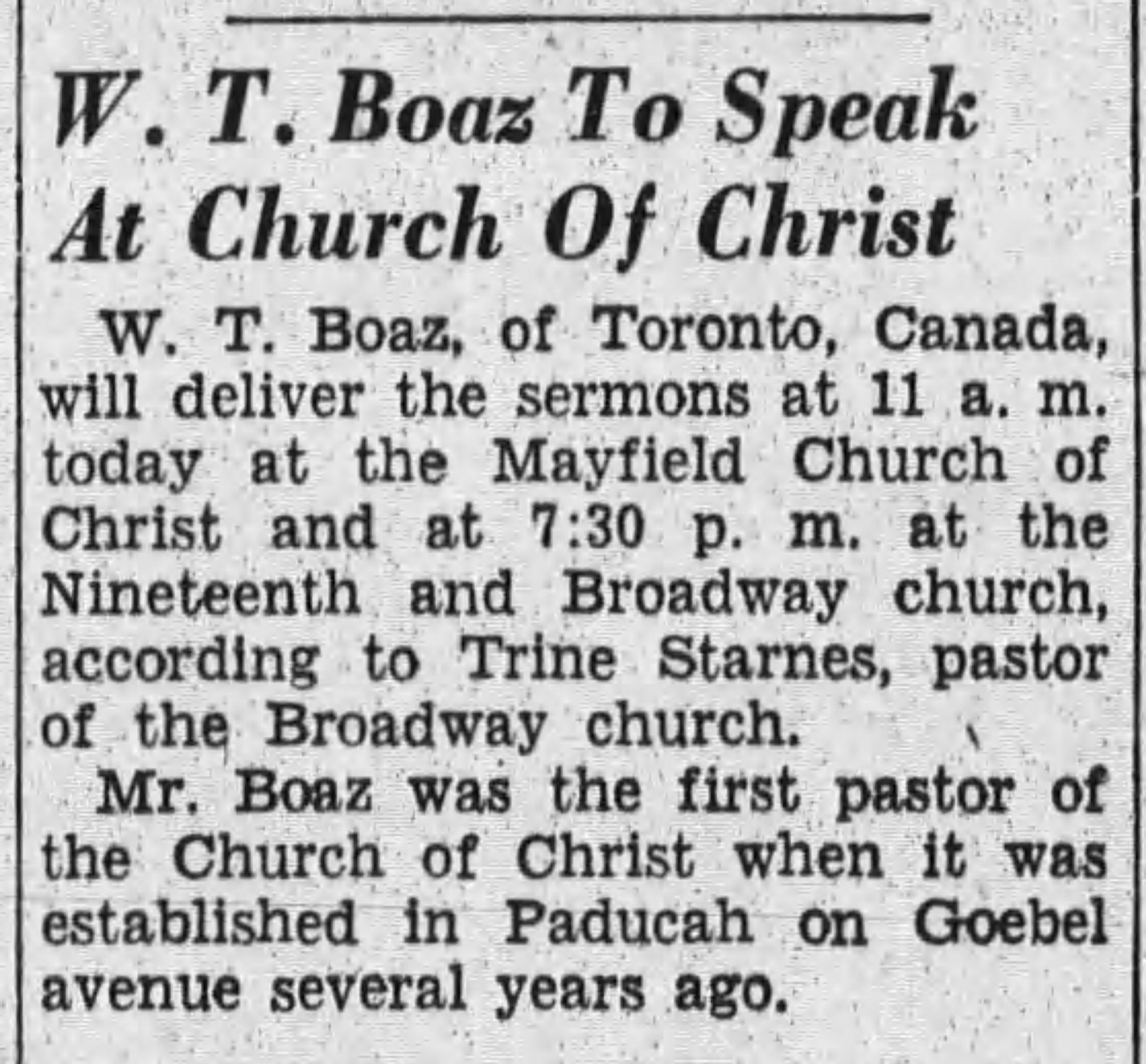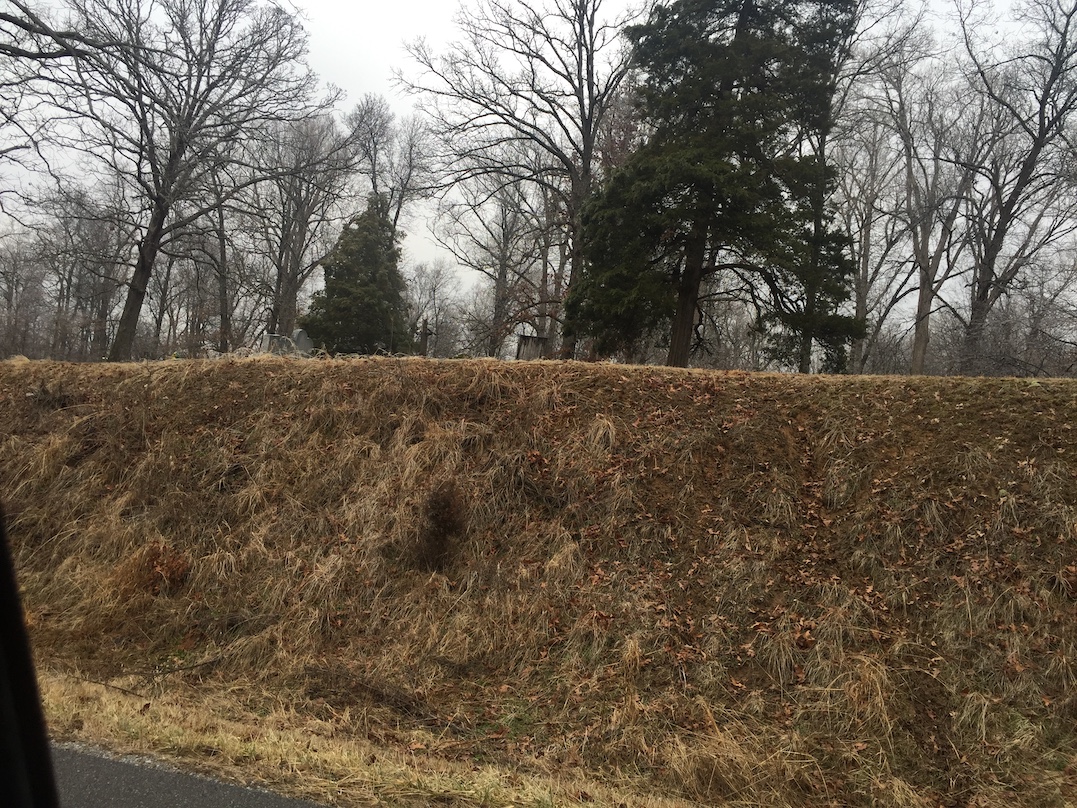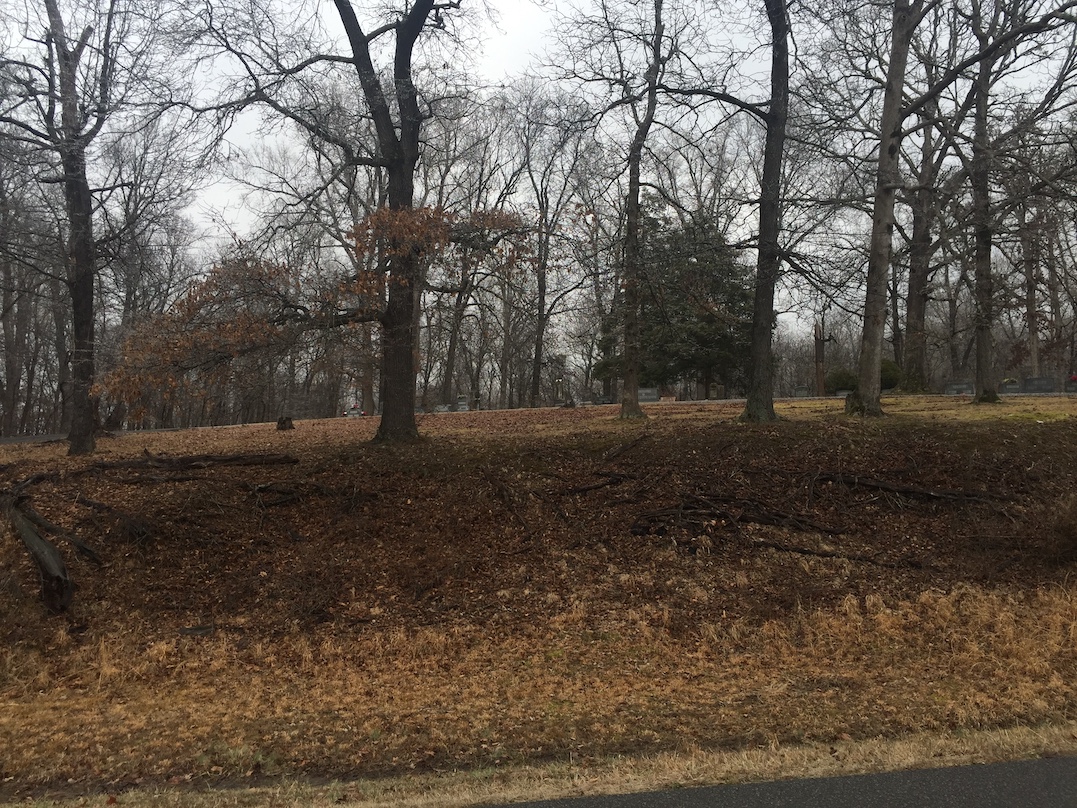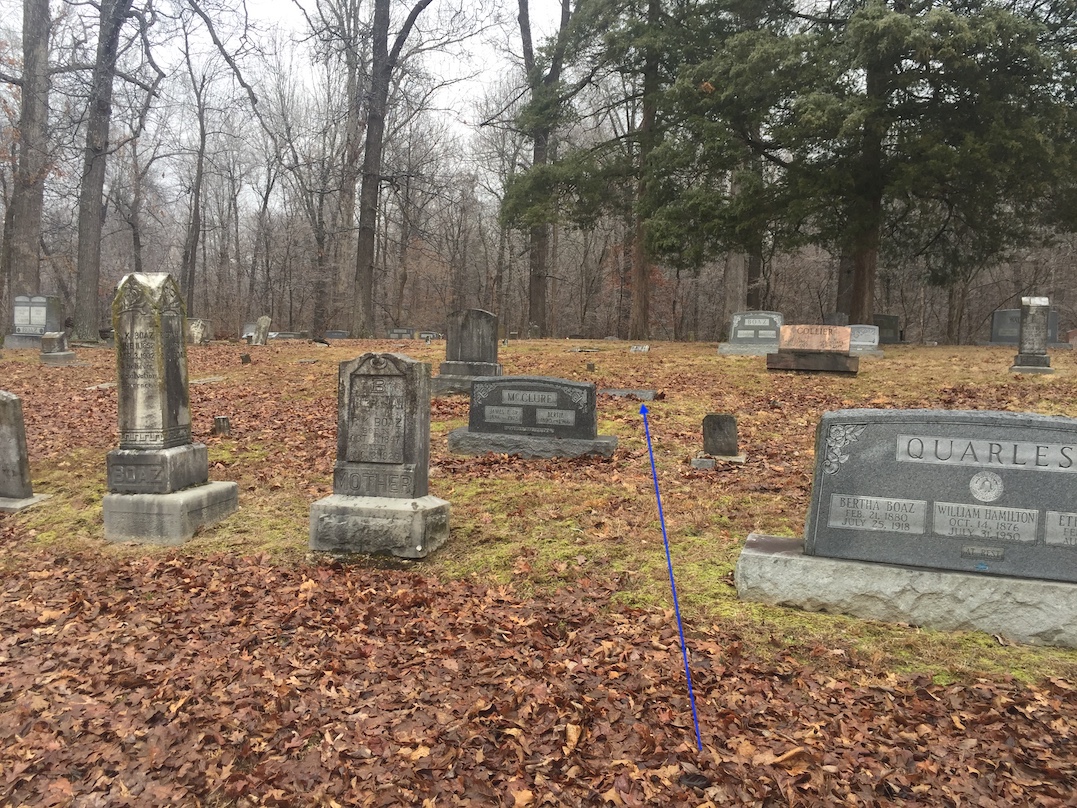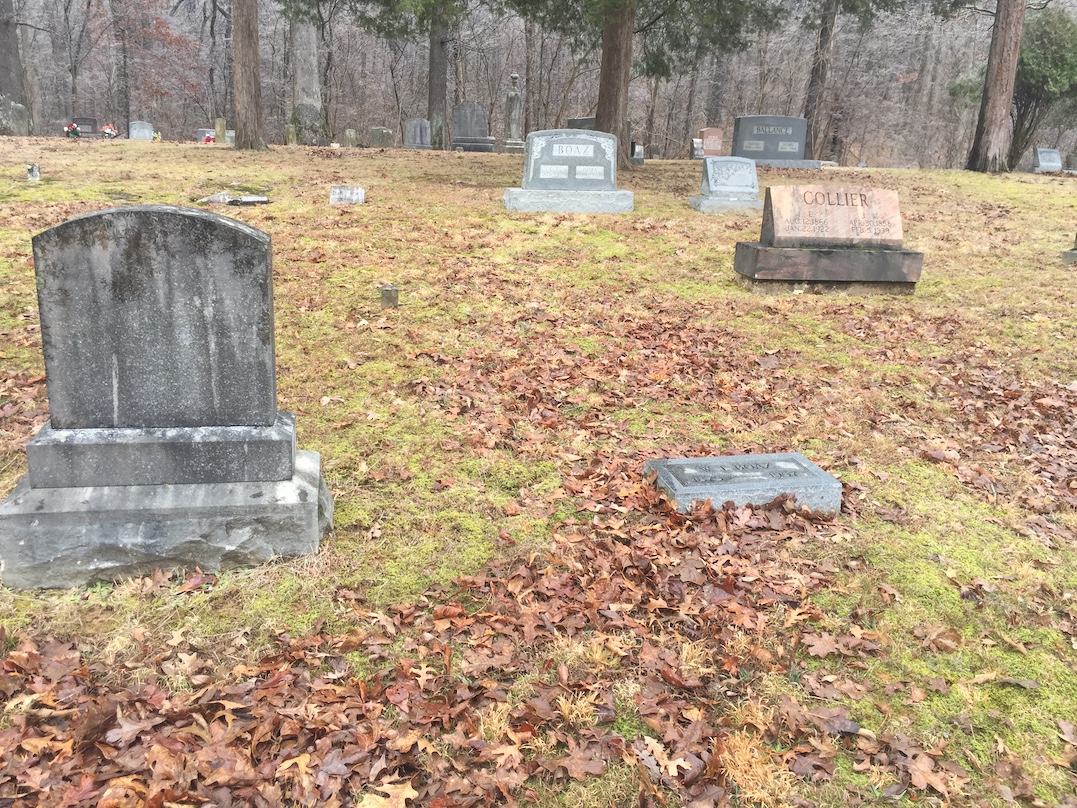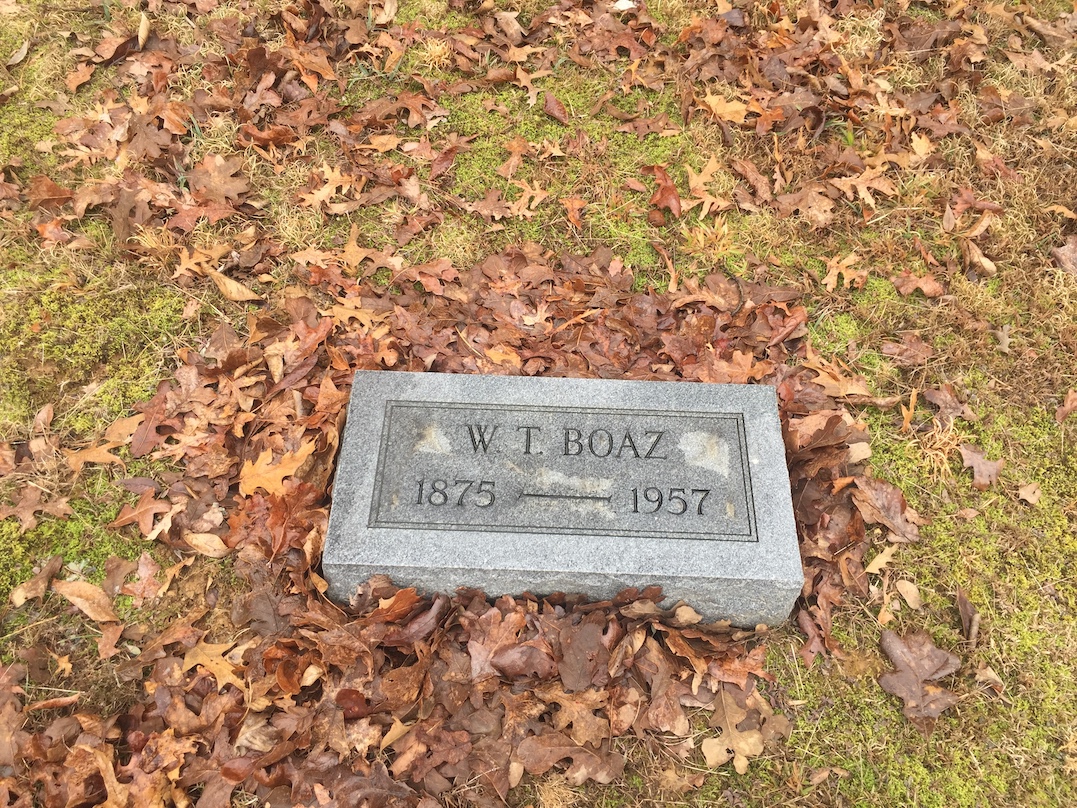William Thomas Boaz
1875-1957
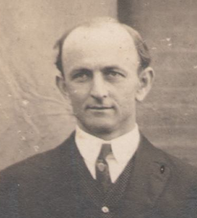
![]()
William T. Boaz was born January 7, 1875 in Graves County, Kentucky. He was the son of Thomas F. and Virginia (Puryear) Boaz. He was of Irish and French descent. He received his education at West Kentucky College, Mayfield, Ky., and Georgia Roberson Christian College of Henderson, Tennessee. He was baptized into the Baptist Church by H.K. Thomas in 1891. Three years later he heard the preaching of J.S. Harkins of the Christian Church. Discovering the way more completely, he was baptized into Christ at the hands of brother Harkins. In 1896 he began preaching the gospel of Christ. Within two years he challenged his former preacher, H.K. Thomas, to a debate on the subject of the biblical teaching of baptism. This was his first debate of many debates.
In 1897 he moved down to Milan, Tennessee to work with the Fairfield church of Christ. During the next 30 months he preached the first Sunday of each month and then for other churches in the area on alternative Sundays. Some of the other churches included Roans Creek at Poplar Springs and at Glass, Tennessee.
In 1899 he had a debate with L.Y. Brown, a Baptist, on the subject of whether salvation takes place before or after baptism. The discussion was held at Pilot Oak, Graves County, Ky. (GA, 10.05.1899.639.) In December of that year brother Boaz was engaged with another Baptist, T.F. Moore, on the same subject at the Walnut Grove church of Christ in Fulton, Ky. (GA 12.7.1899.773.) The following year another discussion on baptism took place near his home at Cuba, in Graves County, Ky., with W.M. Rudolph, a Baptist from Bloomfield, Missouri. The discussion began on December 4, 1900. (GA, 11.29.1900.757.) Around the same time the next year he faced Rudolph again, this time at the Lebanon church of Christ about six miles south of Mayfield, Kentucky, once again on the design of baptism. (GA 12.12.1901.797). Then, in July of 1902, he was involved in a discussion with Primitive Baptist, C.K. Haines. It took place at Bumpus Mills, Tennessee, on the subject of conditional versus unconditional salvation. (GA 08.07.1902.511). In December of that year he met C.H. Cayce (Kirkland Baptist) at Sedalia, Kentucky. (GA 11.06.1902.709). Soon after the debate he moved to Sedalia to evangelize in the area.
William married Effie Jones, January 1, 1900.
In February, 1903 he conducted a discussion with Baptist, A. Nunnery, at Chapel Hill church of Christ, about six miles south of Milan, Tennessee. Then in March he debated L.Y. Brown in the Baptist Church at Johnson’s Grove, four miles south of Fulton, Kentucky. (GA, 01.29.1903.77) Again, in December 1904 he debated a Missionary Baptist by the name of Elder H.B. Taylor in a four day discussion on the general church question.
His preaching took him to Arkansas, Mississippi, Tennessee, Kentucky, and Alabama, holding gospel meetings and debates under big tents, in denominational building, in school houses and in buildings owned by the brethren. During his time in West Kentucky, he worked closely with other preachers in the area like W.S. Long, Jr., A. O. Colley, John R. Williams, G.W. Smith and his son, G. Dallas.
In January 1905 he began attending Georgie Robertson Christian College in Henderson, Tennessee. In March of that year he had a debate with J.E. Skinner (Baptist), on the subjects of when the church was established, before or after the death of Christ. The other discussion was on the nature of baptism as it has to do with salvation. The debate was held at the Union Grove church of Christ in Murray, Kentucky. In July, another debate took place at Antioch church of Christ, about 12 miles west of Henderson, Tennessee between Boaz and W.Q. Young of the Baptist church on similar propositions as the one just mentioned. In October of that year, still another debate with Baptist, B.F. Hyde was conducted at Weaver’s Store, in Stewart County, Tennessee, about eight miles south of Herndon, Kentucky.
Another debate was carried out in late March 1906 at Cottage Grove, Tennessee. Beginning on the 27th, W.T. Boaz of Hazel, Kentucky, met H.B. Taylor, a Baptist from Murray, Ky. (GA 03.15.1906.175 & 04.26.1906.269) In November, he was involved in another debate with J.E. Skinner (Baptist) at Poplar Springs church of Christ in Stewart County, Tennessee. (GA 11.01.1906.701) In July 1907 he had a debate with O.A. Utley, a Baptist from Camden, Tennessee. The discussion was held at Safford, Tennessee. (GA 07.04.1907.427)
In the Utley debate, a report was sent in by L.F. Williams who commented, “Brother Boaz introduces but few arguments, but defends them as but few men can. I have heard some of our debaters use more oratory, wit, and sarcasm, but have never yet heard one who pressed his arguments as hard as Brother Boaz. He is abundantly able to meet any man among the Baptists.” (GA 08.15.1907.522)
By the end of 1907, W.T. Boaz had held about twenty discussions, however, he was no where near the end of defending the cause he loved so well. In November, he held a third debate with J.E. Skinner, discussing the same subjects as before: “the Bible teaches that the church of the New Testament was set up, or established, before the death of Christ.” Skinner affirmed and Boaz denied; and the second proposition was that “the Bible teaches that baptism to a penitent believer is one of the conditions of pardon of past, or alien, sins.” W.T. Boaz affirms; and J.E. Skinner denies. This event was a four-day discussion November 5-8, held at Poplar Springs church of Christ in Stewart County, Tennessee. (GA 10.17.1907.671.) Within eleven days, he was involved in another discussion with Elder C.H. Cayce in Linden, Tennessee. This debate had Cayce affirming that the Bible teaches that all from whom Christ died will be finally saved in heaven.” Boaz denied. The last part had W.T. Boaz affirming, similar to previous debates, that baptism was a condition of pardon of past sins. Cayce denied. This event was held at the Little Rockhouse Creek church of Christ about ten miles southeast of Linden, Tennessee. (GA 11.14.1907.725.) A report of this debate appeared in the Gospel Advocate in the January 9th, 1909 edition on page 30. Also in this issue was the report that W.T. Boaz had moved to Columbia, Tennessee to work with the congregation there as well as churches in the area.
With his move to Columbia, he devoted himself entirely to evangelistic work. Tent meetings for two weeks or more brought about great results for the gospel. In the fall of 1908 and spring of 1909 he met at least two from the Sabbatarians, an Elder McVagh, and then an Elder Horton. (GA 02.25.1909.241.) In June, he debated H.B. Taylor, a Baptist, on similar propositions as most of his debates concerning the church and salvation. In November, he held a similar debate with a J.B. Hardy, a Primitive Baptist from Croft, Kansas. It was held at Slayden, Tennessee, with J.W. Shepherd moderating for brother Boaz. (GA 09.23.1909.1214.) G.C. Brewer reported on the debate in the December 2nd edition of Gospel Advocate, on page 1524. In December he held another debate with O.A. Utley in Hickman County, Tennessee. (GA 03.03.1910.280) In March of the following year, another meeting between brother Boaz and J.B. Hardy was held at New Hope Baptist Church, about seven miles southwest of Centerville, Tennessee. (GA 03.10.1910.305). However, when the time arrived, brother Boaz showed up for the debate, but Hardy was nowhere to be found. (GA 04.21.1910.509) On May 12, a lengthy article appeared in the Gospel Advocate from the hand of brother Boaz explaining why Hardy did not show.
When a children’s home was established at Columbia, Tennessee, W.T. Boaz was a chief promoter of the work. A charter from the State of Tennessee was procured in 1910, resulting in the organization of the Tennessee Orphans’ Home. W. T. Boaz was elected president. (GA 03.24.1910.358). A fuller explanation of he and sister Boaz’ involvement with the children’s home appeared in the September 15th edition of GA on page 1036. J.C. McQuiddy explained that, “their hearts, being filled with and all mellowed by the love of God, would not tolerate the idea that penniless and helpless they (the children,SDH) should wander the streets, to be debauched and ruined by sin. In tenderness and compassion they reached out an open hand. They took them into their own home.” Twenty four children made up the first home overseen by the esteemed brother and sister Boaz. By the end of 1912, he reported there were fifty-three children in the home (GA 12.05.1912,1309).
In the spring of 1911, W.T. was requested to come to Sheffield, Alabama by the brethren there, in an effort to withstand the onslaught being made by the Seventh Day Adventists that had moved into the area. In the summer of 1910 a tent had been set up with regular preaching from the Adventist preachers concerning the need to worship on Saturdays. On March 19th, a discussion was held between W.T. Boaz and Elder Maxwell of Hammond, Louisiana. Once again, J.W. Shepherd attended to moderated for brother Boaz. A report of the event appeared in the GA in the April 13, 1911 edition, on page 452.
A debate took place beginning February 27, 1912 between brother Boaz and Baptist preacher/debater I.N. Penick. It took place at Viola, Kentucky, where the subjects discussed were the typical church and salvation topics. T.B. Thompson reported on the event in the March 21st issue of GA on page 382.
On April 3 1913 W.T. had another debate, this time with A.B. Gardner of the Missionary Baptist Church. The discussion was at Cool Springs, Ohio County, Kentucky. It was on the typical church establishment/baptism discussion. A report on the debate appeared in the May 8th edition of the Advocate on page 435.
In November 1913, a debate was held at Dixon Springs, Illinois, between brother Boaz and an Elder Renfro of the Missionary Baptist church. It was held a few miles north of Paducah, Kentucky, across the Ohio River. In early December he was in another debate, this time in Elizabethtown, Illinois with H.H. Wallace of DuQuoin, Illinois. It was reported that Mr. Wallace was the strongest Baptist debater in Illinois. (GA 11.27.1913.1165.) A report appeared in the January 8, 1914 issue of GA on page 37.
Some struggles in the Tennessee Children’s Home are worth noting at this point. On May 2, 1912 an electrical fire destroyed the building used to wash and clean the children’s clothing, leaving the home with the need for hundreds of dollars in repairs and replacement of clothing lost to the children as well as sheets, towels, and other articles utilized by the Home. Then, in the spring of 1914, W.T. and some of the children in the home suffered through a round of smallpox. It was a real struggle for all involved including several weeks in quarantine, but all survived.
However, within weeks, brother Boaz was back on the debate circuit. On July 7, 1914 he began a debate with Missionary Baptist minister I.N. Hollis at Luna’s Chapel near Lawrenceburg, Tennessee. Three propositions dealing with the establishment of the church, the possibility of apostasy, and the communion were discussed.
On January 31, 1916, brother Boaz met J.A. Locklear of East Gadsden, Alabama, a preacher for the Ordinance Branch of the Holiness Church, for a debate in New Decatur, Alabama. G.C. Brewer called the debate a “battle royal” event, and said that “Brother Boaz will rout his opponent” from his positions, “with the siege guns of truth and the howitzers of heaven.” He referred to brother Boaz as the “Napoleon of Polemics,” and he has seen many an Austerlitz or Lodi, and we predict that this will not be a Waterloo.” (GA, 01.20.1916.71). In the February 24th issue of GA on page 190, brother Brewer reported on the debate saying, “Brother Boaz fully lived up to his reputation in this debate. Of course he did not have a fair chance, as he had no opponent, but he presented the truth in a strong and forceful manner.” (GA 02.24.1916.192)
In a stunning article appearing on page 2 of the Nashville Tennessean, October 13, 1917, under the title, "Orphans' Home Head Removed: Rev. W.T. Boaz of Columbia Institute Charged With Immoral Conduct," the brotherhood was left in shock as they read the allegations of misconduct with girl inmates at the orphanage. However, on page 1009 in the October 18, 1917 issue of Gospel Advocate under the title, “Important Changes at the Tennessee Orphans’ Home,” the brotherhood heard a less dramatic inference to brother Boaz' dismissal as superintendent of the children’s home. It spoke of allegations that funds had been mishandled. When an independent audit was requested by the State, it was determined that brother Boaz mishandled funds coming to the orphanage. Some of the money that came in for the orphanage, he had deemed payment to him personally for preaching and other activities for the church. The result was his immediate removal from the home. Unfortunately, when the news hit the local newspapers in central Tennessee, the charges were more on the lines of immoral activity with some of the children. Later the board put out an official statement that appeared on page 9 of Columbia, Tennessee's newspaper, The Columbia Herald and Mail, October 19, 1917. The statement said the board did not charged W.T. Boaz with "criminal conduct," but stated he was dismissed because of "lax management and other indescretions." Some reports interpreted the "indescretions" as immoral behavior with some of the children. However, the Board never charged him with it, and W.T. always maintained his innocence in the matter.
No matter the level of his guilt, W.T. Boaz' reputation in the church was ruined in the south, no matter how innocent his claims were. So, he and his family moved to Toronto, Ontario, Canada for a new start. There he continued preaching for the church. It was not for several years that many heard of his church work, but he did continue to preach and build the church where he was. Toward the end of his life he held meetings back near his home in Kentucky, (some newspaper advertisments below) and his work was mentioned in the Gospel Advocate. When he passed from this life March 31, 1957, an obituary appeared in the GA where he was heralded for his good work for the Lord's church. Thus lived a man who strove for the gospel of Christ. He held over a hundred debates in his life. He preached in countless gospel meeting and baptized hundreds, perhaps thousands. His place of burial is among those of his relatives who knew and loved him greatly, always believing his him--always supporting the man to the very end.
-Scott Harp, 02.04.2020
![]()
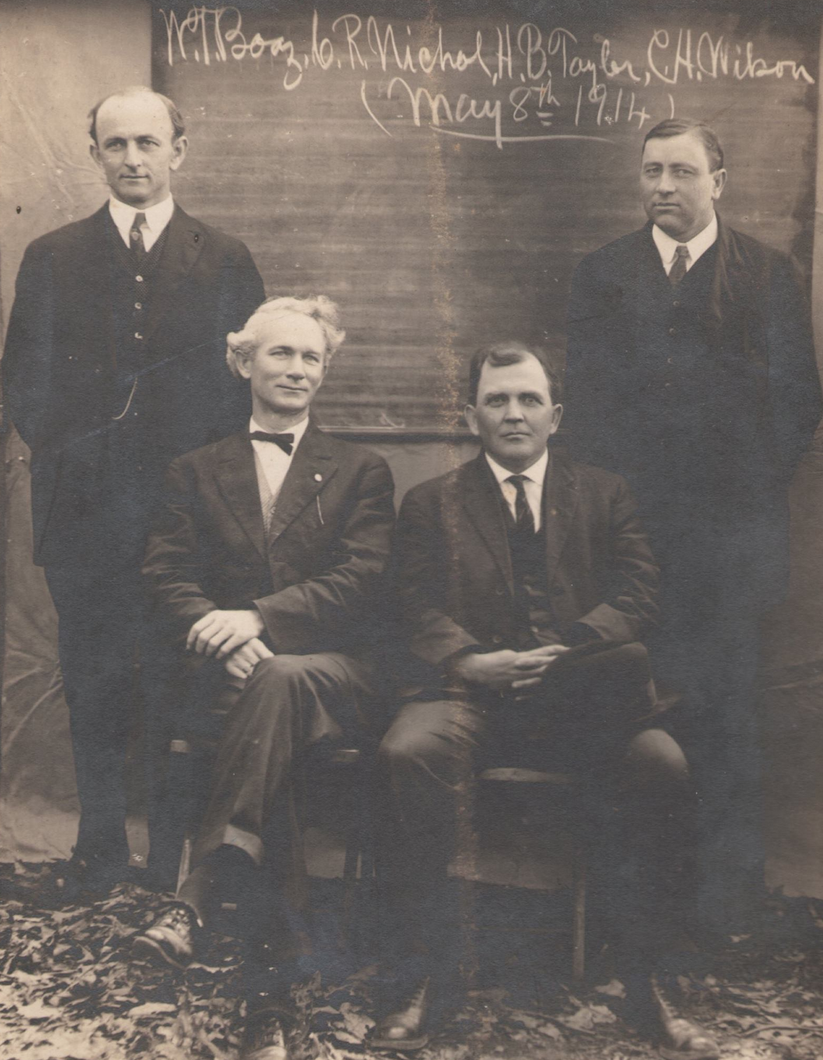
May 8, 1914
(l-r) W.T. Boaz, C.R. Nichol, H.B. Taylor, C.H. Wilson
![]()
Advertisement For Gospel Meetings
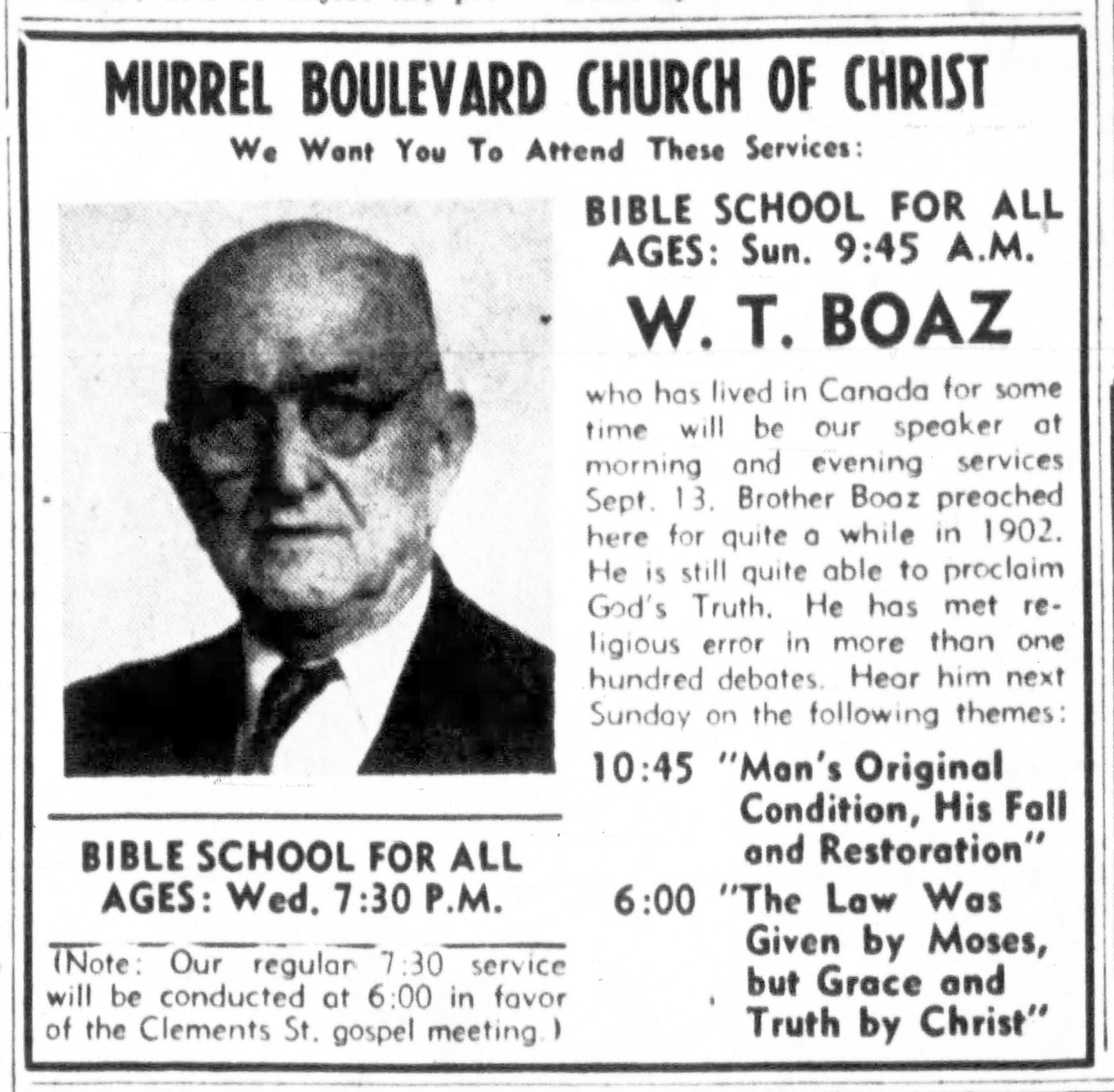
The Paducah Sun, Saturday, September 12, 1953 page 5
The Paducah Sun Democrat, Sunday February 17m 1946, p.2
![]()
A Typical Report To Gospel Advocate Of W.T. Boaz' Many Debates
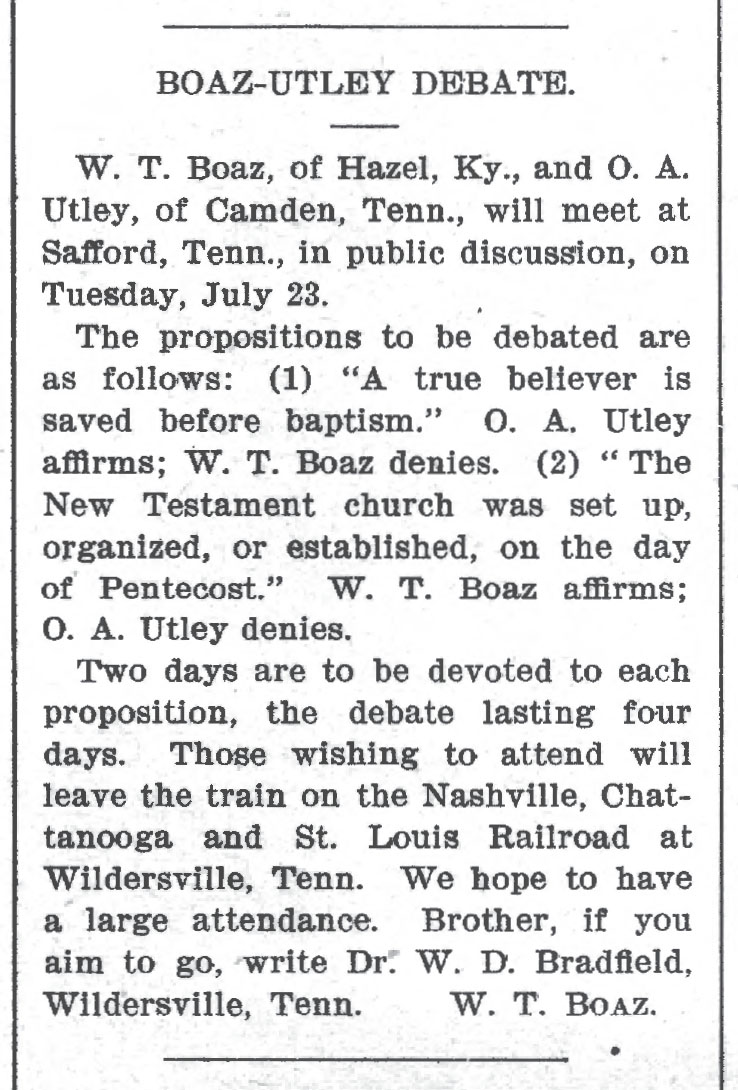
Gospel Advocate, Thursday, July 4, 1907, p.427
![]()
Gospel Advocate Obituary For W.T. Boaz
W. T. Boaz, veteran preacher and debater, died in Toronto, Canada, on Sunday, March 31. Services were first conducted in Toronto, after which his body was removed to Mayfield, Ky., where I conducted another service. Burial took place at the Boaz Cemetery near Mayfield. Brother Boaz conducted his last meeting at the age of eighty in 1955, at Dexter, Ky. His first sermon was preached many years ago in an adjoining county at Pottsvile, Ky. He had engaged in more than one hundred debates. He was blessed with a keen mind, a strong body and a powerful voice. Nearly fifty years ago he planned and helped to conduct a meeting of eight weeks' duration in my home town of Paducah. G. Dallas Smith, A. O. Colley and John T. Smith were associated with him in that meeting. Brother Boaz preached four weeks and G. Dallas Smith and A. O. Colley preached two weeks each. John T. Smith led the singing. As a result of that meeting, and the groundwork which Brother Boaz had already done, a congregation of more than sixty members was established. Today there are four thriving congregations in Paducah and these have established other congregations in West Kentucky, Southern Illinois and Southeast Missouri. Truly may it be said of him, that his good work continues to follow him and "by it he being dead yet speaketh." He led my father and mother out of the errors of the Christian Church. They were among those who comprised that newly established congregation in Paducah, old George Avenue, which is now Broadway. I shall ever feel indebted to him. He is survived by his widow, Mrs. Effie Boaz, two sons and three daughters of Canada; four sisters, Mrs. Mina West, Mrs. Zena Gough, Mrs. Joseph Winn and Mrs. Elbert West, all of Graves County, Ky., and one brother, Edward Boaz, of Nashville, Tenn.
Charles L. Houser.
Gospel Advocate, April 25, 1957, page 271.
![]()
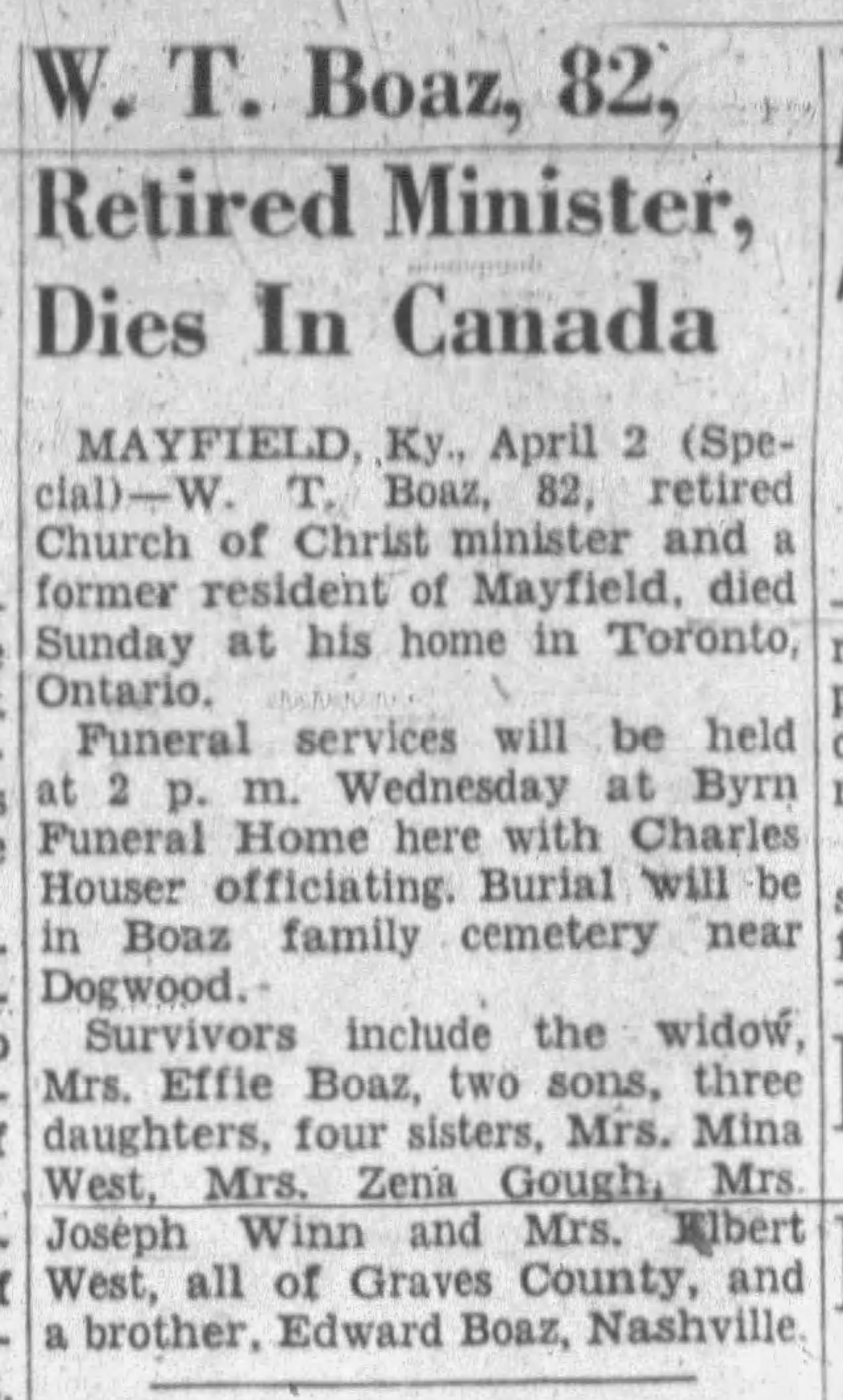
The Paducah Sun, Tuesday, April 2, 1957 pages 5. (Padukah, Ky)
![]()
Directions To Grave
The Boaz Cemetery in western Kentucky, is just a few miles west of Calvert City. The GPS location is the exact location of the grave in the cemetery. The cemetery is located on County Hwy. 1684.
GPS Location
36°54'10.2"N 88°34'45.0"W
36.902841,-88.579152
![]()
![]()
Photos Taken 02.07.2018
Webpage produced 02.02.2020
Courtesy Of Scott Harp
www.TheRestorationMovement.com
![]()
